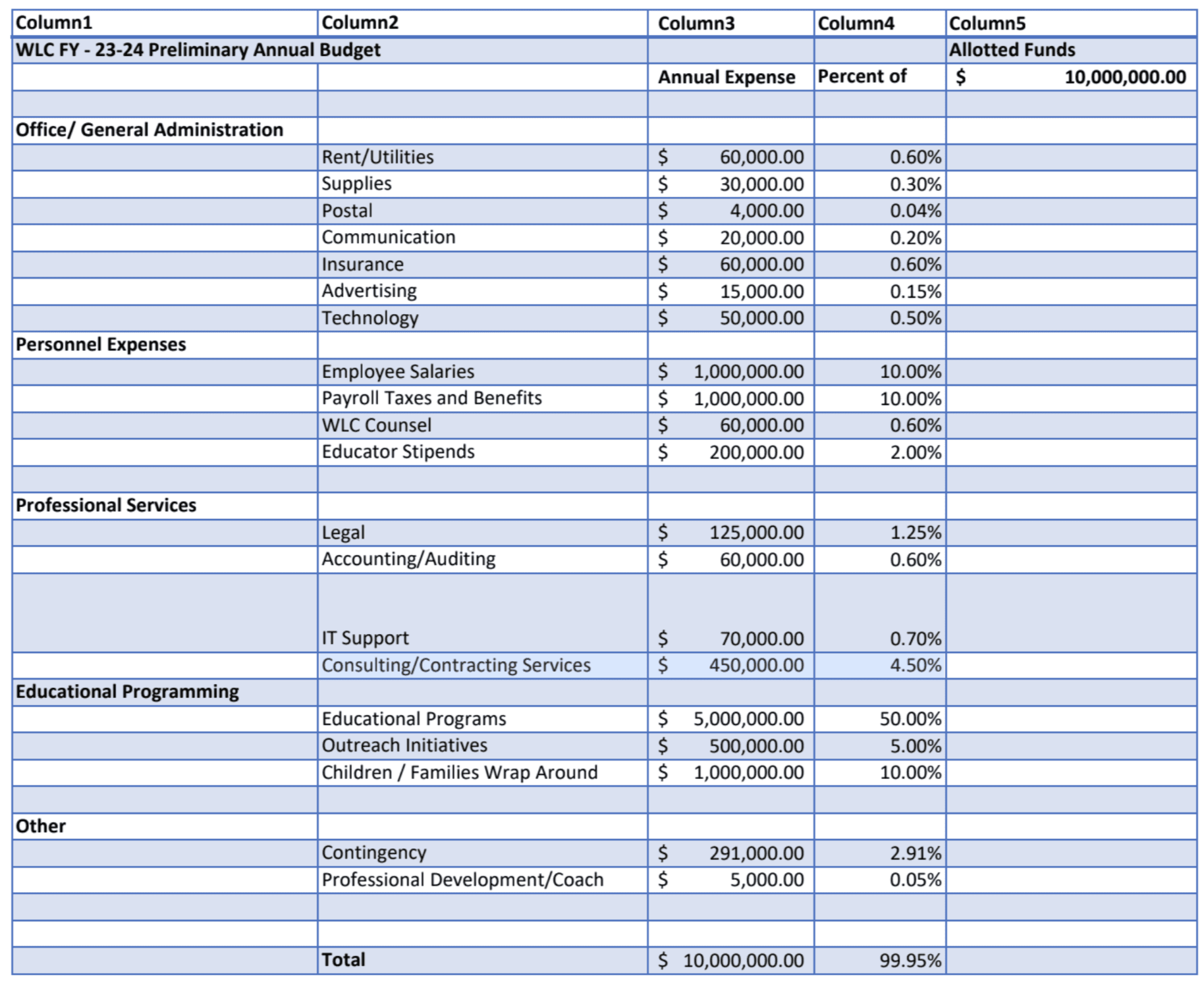
The Wilmington Learning Collaborative has finalized a preliminary budget for next year, which includes $10 million in spending.
The Wilmington Learning Collaborative has proposed a way to spend the $10 million it will get from the state next year as the effort to improve educational and societal outcomes for the Wilmington students ramps up.
The group’s governing council voted to approve the budget Tuesday night, and it will now head to the Department of Education for approval before becoming official.
WLC’s budget
The largest allocation is $5 million, or 50% of the budget, for educational programs. These can include new curricula or books.
“Keep in mind that each of the schools will be developing their own kind of turnaround plans or their own working school plans,” said councilwoman Alethea Smith-Tucker, who’s a board member in Christina.
“This is money directly allocated to go into educational programming, and that should be the highest expenditure – money toward the kids,” she said.
Three line items distribute $1 million, or 10% of the budget, each. Those are employee salaries, payroll taxes and benefits, and wraparound services for children and families.
Wraparound services focus on filling the needs of a student that a school day doesn’t. They include programs like before- and after-school, summer programs, interventions, tutoring, wellness centers, child care and other social services.
The next largest budget item is outreach initiatives, which will take up 5% of the budget, or $500,000. These initiatives could be town halls and meet-and-greets for community engagement or connecting with external partners.
Consulting and contracting services will cost $450,000, or 4.5% of next year’s budget. An example of this line item is the learning collab contracting Delaware State University to help with their executive director search.
Other purchases that would fall under this category would be if a school contracts a tutoring service.
Here’s how the remaining funds will be spent if approved by the Department of Education:
Amendment
The Collaborative, which was created with the November 2022 signing of a memorandum of understanding, involves nine city elementary schools from Brandywine, Christina and Red Clay school districts.
Its governing council was not filled until February of this year, so the group is seeking an amendment to extend the planning period, which was supposed to end with the 2022-2023 school year.
AMENDMENT DISCUSSION: Learning Collab seeks permission to extend planning period
Planning was supposed to be the time the governing council would be formed and an executive director hired with needs such as root-cause assessments conducted at each school and more.
The three participating districts will vote in their August board meetings whether to amend the signed agreement to extend the planning period. All three boards were presented with the amendment this month.
Laura Burgos, who has been offered the job of executive director, will be working with the districts and schools to help implement the initiatives the collaborative spends money on.
“What we discovered was that because the full council was not seated until February, it was impossible to permit the executive director to be on board and to give her an entire year to complete the aforementioned assignments,” said council chair Rev. Shanika Perry at Brandywine’s school board meeting Monday.
“Therefore, as a council, we are asking for us to revisit the MOU and asking for an extension of the planning year,” she said.
She added that extending the timeline does not hinder the work the collaborative is currently doing.
Most of that work is focused on building the foundation of the agency, such as bylaws, meeting procedures, creating a budget, creating school plans, engaging with teachers and parents and starting to conduct a needs assessment and root cause analysis.

Raised in Doylestown, Pennsylvania, Jarek earned a B.A. in journalism and a B.A. in political science from Temple University in 2021. After running CNN’s Michael Smerconish’s YouTube channel, Jarek became a reporter for the Bucks County Herald before joining Delaware LIVE News.
Jarek can be reached by email at [email protected] or by phone at (215) 450-9982. Follow him on Twitter @jarekrutz
Share this Post





